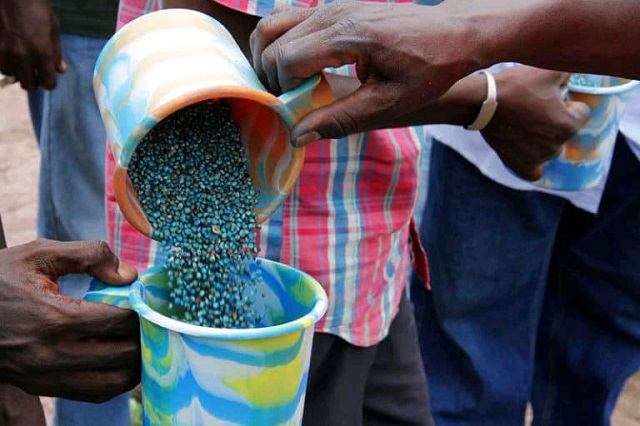
Kampala, Uganda | THE INDEPENDENT | The International Institute of Tropical Agriculture [IITA] developed a scientifically proven biocontrol solution to minimize aflatoxin contamination in Africa.
The all-natural, safe, easy-to-use, and environmentally friendly product known as Aflasafe has however not reached most farmers in the region despite its effectiveness in minimizing the liver-cancer causing fungus or aflatoxin contamination in maize and other grains.
IITA has just released a statement amidst an ongoing trade dispute following the Kenyan ban on importation of Ugandan and Tanzanian maize over alleged high aflatoxin levels.
The statement says the biocontrol solution helps to produce aflatoxin-safe food for consumers, and traders can sell to lucrative regional and international markets with guaranteed higher returns.
Aflasafe, according to IITA consistently reduces aflatoxin contamination by more than 80% in maize and groundnut. “It uses native non-toxin producing (atoxigenic) strains of Aspergillus flavus to naturally out-compete their aflatoxin-producing cousins. The product is broadcast in the field 2 to 3 weeks before crop flowering and it prevents contamination before, during, and after harvest. Country-specific products are developed with locally sourced atoxigenic strains” reads part of the statement issued by Catherine Njuguna, the Regional Corporate Communications Officer for Eastern Africa at the IITA office in Tanzania.
In Tanzania, Aflasafe TZ01 has been fully registered by the relevant regulatory bodies and is being manufactured and marketed by A to Z Textiles Mills Limited in Arusha. In Uganda, statement says local strains for making a Ugandan version of Aflasafe have been identified.
According to IITA, the strains of the Aflasafe product registered in Kenya are endemic to Uganda and Burundi, and can be tested in Uganda. “The next steps in Uganda are to validate the Uganda specific Aflasafe product and the regional Aflasafe KE01 product in farmers fields to generate sufficient data for registration and to identify a private-sector player to manufacture and get the product into the hands of maize and groundnut farmers,” said the statement.
IITA says it has partnered with the National Agriculture Research Organization (NARO) with funding from aBi Development Ltd to finalize the development, testing, and registration of Aflasafe for Uganda and subsequently transfer the technology to a suitable private sector entity. Issues of food safety have risen in the news recently in East Africa due to the ban on maize imports from Tanzania and Uganda by the Kenyan government due to reportedly high aflatoxin levels, well over the allowable limit of 10 ppb in Kenya.
This decision followed surveillance by the Agriculture and Food Authority of Kenya on the safety of food imports. The ban has since been lifted with strict conditions to the exporters including, must have certificates of conformity showing that the maize meets the required safety standard. This has highlighted the need for concerted and coordination of efforts at the regional level to control aflatoxins to ensure food security for all.
*****
URN
 The Independent Uganda: You get the Truth we Pay the Price
The Independent Uganda: You get the Truth we Pay the Price



This solutions should have been there why wait for a problem instead of solving the it earlier